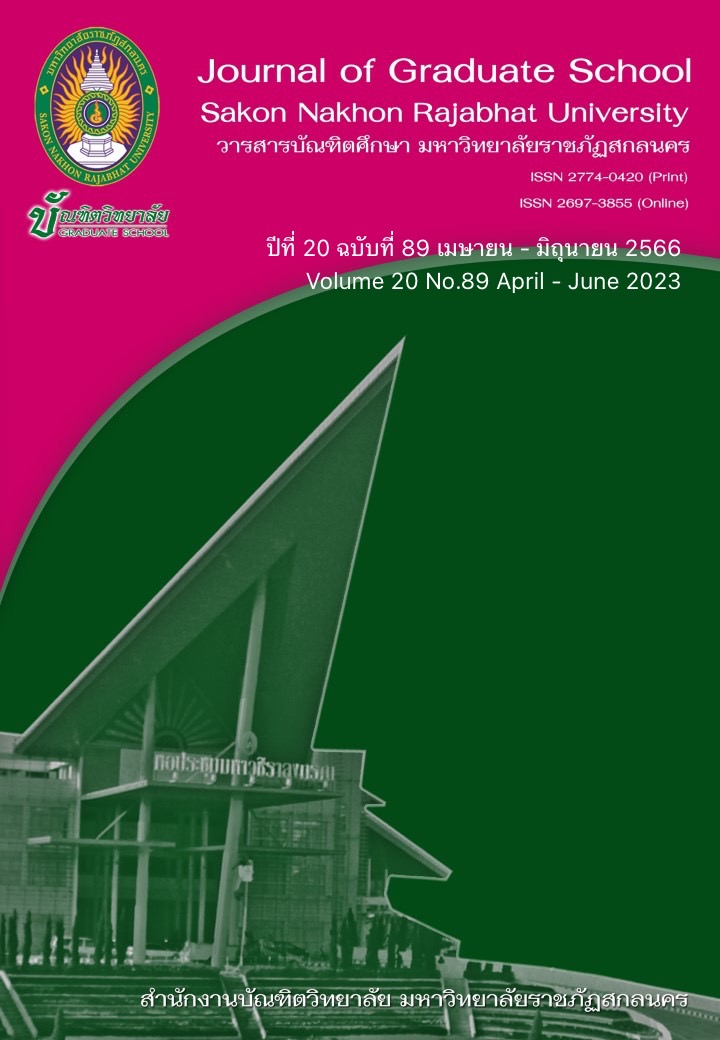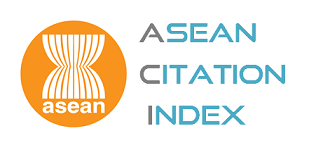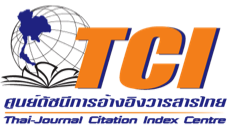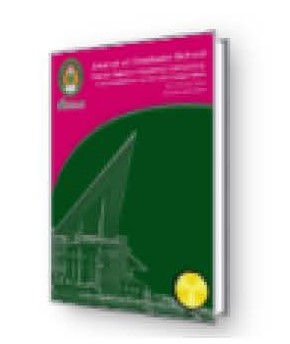การโค้ชของผู้บริหารสถานศึกษาที่ส่งผลต่อสมรรถนะของครูผู้สอนในศตวรรษที่ 21 สังกัดสำนักงานเขตพื้นที่การศึกษามัธยมศึกษาอุดรธานี
Keywords:
Coaching Factors of School Administrations, Teacher Competency in the 21st CenturyAbstract
The purposes of this quantitative research were to 1) examine the relationship between coaching factors of school administrators and teacher competency in the 21st century under the Secondary Educational Service Area Office (SESAO) Udon Thani, and 2) construct the predictive equation for coaching factors of school administrators affecting teacher competency in the 21st century under SESAO Udon Thani. The sample group consisted of 341 teachers working under SESAO Office, obtained through multi-stage random sampling, in the academic year 2021. The research instruments included sets of 5 level-rating-scale questionnaires on coaching of school administrators with the reliability of 0.97 and the descriminative power ranging from 0.47 to 0.85, and teacher competency in the 21st century under SESAO Udon Thani with the reliability of 0.98 and the descriminative power ranging from 0.57 to 0.84. The statistics for data analysis were mean, standard deviation, Pearson's product-moment correlation coefficient, and Stepwise multiple regression analysis.
The results were as follows:
1. The relationship between the coaching factors of school administrators and teachers' competency in the 21st century under SESAO Udon Thani had a positive correlation at the .01 level of significance.
2. The coaching factors of school administrators affecting teachers’ competency in the 21st century under SESAO Udon Thani comprising two factors, namely coaching goal setting (X1), and giving feedback (X2), were able to explain the variability of teachers’competency in the 21st century at the .01 level of significance, with a multiple correlation coefficient (R) of .447 and a predictive coefficient (R2) of .227 or 22.70 percent. The prediction equations could be written on raw and standardized scores as follows:
Y' = 2.688 + .204X1 + .133X4
Z'Y = .325Z1+ .211Z4
References
คม สุวรรณพิมล. (2555). จะเป็นโค้ชได้อย่างไร. เข้าถึงได้จาก http://www.coachforgoal.com/index.php?action=new. 15 สิงหาคม 2564.
จิตณรงค์ เอี่ยมสำอางค์. (2555). การพัฒนารูปแบบการโค้ชทางปัญญาแบบเพื่อนช่วยเพื่อนเพื่อพัฒนาสมรรถภาพการโค้ชและการจัดการเรียนรู้ที่ส่งเสริมการคิดวิเคราะห์ของครูพาณิชยกรรม. วิทยานิพนธ์ ปร.ด. กรุงเทพฯ: มหาวิทยาลัยศิลปากร.
จุฑารัตน์ สถิรปัญญา. (2553). The coach มิตรคู้คิดและชิดใกล้ ปรับกระบวนการคิด พัฒนาติดตามและประเมินโครงการ. สงขลา: นำศิลปะโฆษณา.
ธนวัฒน์ ศรีไพโรจน์. (2561). อิทธิพลของโปรแกรมการโค้ชการจัดการเรียนรู้โดยใช้โครงงานเป็นฐานที่มีต่อสมรรถนะของครูผู้สอนเพื่อทักษะการเรียนรู้และนวัตกรรมของผู้เรียน. วิทยานิพนธ์ ปร.ด. กรุงเทพฯ: มหาวิทยาลัยศรีนครินทรวิโรฒ.
ธนัทพัชร์ รชตพงศ์สันต์. (2561). แนวทางการโค้ชชิ่งการปฏิบัติธรรมตามหลักกัลยาณมิตรของวัดพระธรรมกาย. วิทยานิพนธ์ พธ.ม. พระนครศรีอยุธยา: มหาวิทยาลัยมหาจุฬาลงกรณ์ราชวิทยาลัย.
บุญชม ศรีสะอาด. (2553). การวิจัยเบื้องต้น. กรุงเทพฯ: สุวีริยาสาส์น.
ปกรณ์ วงศ์รัตนพิบูลย์. (2557). ใช้ชีวิตคิดแบบโค้ชเพื่อก้าวไปสู่ความสำเร็จ. กรุงเทพฯ: ปัญญาชน.
วิชัย วงศ์ใหญ่และมารุต พัฒผล. (2557). การโค้ชเพื่อรู้คิด. กรุงเทพฯ: จรัลสนิทวงศ์การพิมพ์.
ศิริรัตน์ ศิริวรรณ. (2557). การโค้ชเพื่อการพัฒนาผลงานที่ยอดเยี่ยม. กรุงเทพฯ: เอช อาร์ เซ็นเตอร์.
สิราวิชญ์ วัชรกาฬ (2563) รูปแบบการพัฒนาทักษะการโค้ชสําหรับผู้บริหารสถานศึกษาสังกัดกรุงเทพมหานคร. วิทยานิพนธ์ ปร.ด. กรุงเทพฯ: มหาวิทยาลัยนอร์ทกรุงเทพ.
สุมาลา พรหมมา. (2559). รูปแบบการพัฒนาทักษะการโค้ชของผุ้นำทางการพยาบาล. วิทยานิพนธ์ ปร.ด. สงขลา: มหาวิทยาลัยราชภัฏราชนครินทร์.
สุรศักดิ์ อมรรัตนศักดิ์. (2557). ระเบียบวิธีวิจัยทางการศึกษา. กรุงเทพฯ: ศูนย์ส่งเสริมวิชาการ.
สํานักงานส่งเสริมสังคมแห่งการเรียนรู้และคุณภาพของเยาวชน. (2557). การยกระดับคุณภาพครูไทยในศตวรรษที 21. เอกสารประกอบการประชุมวิชาการ “อภิวัฒน์การเรียนรู้สู่ จุดเปลี่ยนประเทศไทย”. กรุงเทพฯ: บริษัท สหมิตรพริ้นติ้ง แอนด์พับลิสชิ่ง จํากัด.
อนุวัติ คูณแก้ว. (2555). การวิจัยเพื่อพัฒนาการเรียนรู้ สู่ผลงานทางวิชาการเพื่อการเลื่อนวิทยฐานะ. กรุงเทพฯ: จุฬาลงกรณ์มหาวิทยาลัย.
อัญญา เปี่ยมประถม. (2553). การให้และรับข้อมูลป้อนกลับที 9 ส่งผลต่อผลการปฏิบัติงานของพนักงาน: กรณีศึกษา บริษัท ปูนซิเมนต์ไทย (แก่งคอย) จํากัด. วารสารจุฬาลงกรณ์ธุรกิจปริทัศน์, 4(6),42-46.
อิทธิพัทธ์ สุวทันพรกูล. (2561). การวิจัยทางการศึกษา : แนวคิดและการประยุกต์ใช้. กรุงเทพฯ: โรงพิมพ์แห่งจุฬาลงกรณ์มหาวิทยาลัย.
อุทิศ ผาดวงสุข. (2560). การบริหารโดยการโค้ชเพื่อการพัฒนาองค์การ. วารสารวิชาการมหาวิทยาลัยธนบุรี, 11(26), 130-141.
Bartz, D. E. (2017). Communication, Feedback, and Coaching Skills for Managers to Use with Staff Members during the Performance Appraisal Process. International Journal of Business and Social Science, 8(6), 1-5.
Barton, E. E., et al. (2013). Coaching Preservise Teacher to Teach Play Skill to Children With Disabillities. Teacher Education and Special Education, 36(4), 330.
Britton, L. R.; & Anderson, K. A. (2010). Peer Coaching and Pre-service Teachers: Examining an Underutilized Concept. Retrieved from https://www.eric.ed.gov/ ?id=EJ867549. January 5th, 2017.
Champathes, R. M. (2007, March). Coaching for Performance Improvement: The “COACH” Model. Journal of Development and Learning in Organization, 20(2), 17-18.
Cheng, C.K. (2014). Learning Study: nurturing the instructional design and teaching competency of Pre-service teacher. Asia-Pacific Journal of Teacher Education, 42(1), 51-66.
Costa, Arthur L. & Robert J. Garmston. (2002). Cognitive Coaching Foundation Seminar Learning Guide. (5thed). Highlands Ranch, CO: Center for Cognitive Coaching.
Dekker-Groen, Agaath. M., Van der Schaaf Marieke. F., & Stokking, Karel. M. (2013). A Teacher Competence Development Programme for Supporting Student Reflection Skill. Teachers and Teaching: theory and Practice, 19(2), 150-171.
Gottesman, B. (2000). Peer Caaching for Educators. Lanhan: The Scarecrow.Grossman Pamela. (1990). The making of teacher: Teacher knowledge and teacher education. New Yok: Teacher College Press.
Ibarra, H. (2004). Coaching and Mentoring. Boston, MA: Harvard Business School Press.
Kauffman, C. (2006). Positive Psychology: The Science at the Heart to Coaching. in D.R. Stober & A.M. Grant (Eds) Evidence based coaching handbook: Putting best practices to work for your clients (pp. 219–253). John Wiley & Sons, Inc.
Knight, Jim. (2007). Instruction Coaching: A Partnership Approach to Improving Instruction. California: Corwin Press.
Mink, O.G., Owen, K.Q., & Mink, B.P. (1993). Developing high-performance people: The art of coaching. Reading, Massachusetts: Addison-Wesley.
Mukherjee, Sraba. (2014). Corporate Coaching: the essential guide. New Delhi: SAGE Publication.
Patti, J., Holzer, A., Stern, R & Brackett, M.A. (2012). Personal, professional coaching: Transforming professional development for teacher and administrative leaders. Journal 0f Leadership Education, 11(1), 263-274.
Sakolrak, Sosion. (2014). The Strategic development to enhance reading comprehension instructional ompetency of elementary school teachers base on comprehension ability diagnostic instruments. Procedia-Social and Behavioral Science, 116(8), 2946-2951.
Wiggin, G. (2012). 7 Keys to Effective Feedback. Educational Leadership, 70(1), 10-16.
Downloads
Published
How to Cite
Issue
Section
License
Copyright (c) 2023 Journal of Graduate School Sakon Nakhon Rajabhat University

This work is licensed under a Creative Commons Attribution-NonCommercial-NoDerivatives 4.0 International License.
บทความทุกบทความที่ตีพิมพ์ในวารสารบัณฑิตศึกษา มหาวิทยาลัยราชภัฏสกลนคร ถือว่าเป็นลิขสิทธิ์ของบัณฑิตวิทยาลัย มหาวิทยาลัยราชภัฏสกลนคร










